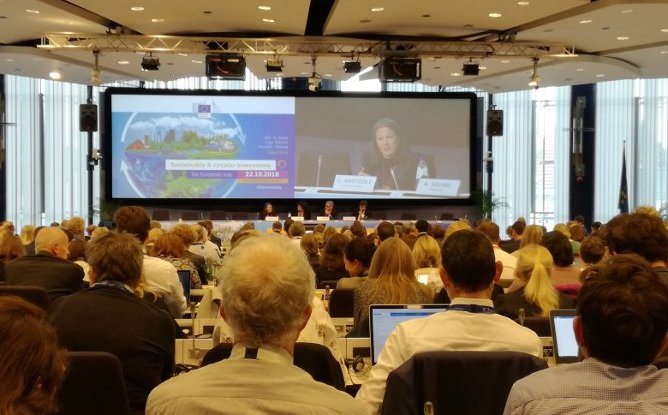Sustainable & Circular Bioeconomy, the European way: Catia Bastioli shows a sustainable and possible development model
The Conference “Bioeconomy - Sustainable & Circular Bioeconomy, The European Way”, promoted by the European Commission within the High Level Event on Bioeconomy, was held today in Brussels on 22 October, with the aim of discussing how to improve the transition to a sustainable development, respecting the environment and the social dimension, in an ever-changing European political context.
Catia Bastioli, Novamont CEO, took the floor during the session "Ensuring environmental, social and economic balance of the bioeconomy", where through the Novamont model, based on the bioeconomy conceived as territorial regeneration, illustrated how it is possible to create value in local areas, both on economic and social terms, contributing to soil protection and responding to the Intergovernmental Panel on Climate Change call for climate change mitigation.
The session was opened by Carlos Moedas, European Commissioner for Research, Science and Innovation in the Juncker Commission and Phil Hogan, European Commissioner for Agriculture and Rural Development, which introduced the works explaining how Matrìca, the Porto Torres biorefinery of Novamont, is an excellent example of sustainable reindustrialisation and of upstream integration with the agricultural value chain.
At the end of the conference, Commissioners Carlos Moedas, and Phil Hogan met with Catia Bastioli and Ilkka Hämälä - Metsa Group CEO - both representing the Biobased Industry Consortium, to discuss about what the EU can do together with the industry to make Europe the global leader of sustainable bioeconomy.
Good discussion w/ Ms Catia Bastioli, CEO @Novamont & Mr Ilkka Hämälä, CEO @MetsaGroup about what the EU can do together with industry to make Europe a global leader in the sustainable #bioeconomy. #eu2018at pic.twitter.com/XZCeceQA64
— Carlos Moedas (@Moedas) 22 ottobre 2018
The conference was an opportunity to present the review of the European Bioeconomy Strategy, updated by the European Commission on October 11, 2018, six years after its first launch. The revision aims to set new challenging objectives, starting from an action plan focused on three pillars: the strengthening and expansion of bio-based sectors, the release of investments and markets, the development of a bioeconomy declined in the territories throughout Europe and the strengthening of the resilience of terrestrial and marine ecosystems through their constant monitoring.
The paper presented estimates that the implementation of the strategy could create up to 1 million jobs in the bio-based industry sector by 2030, contributing to climate change mitigation and reducing CO2 emissions to up to 2.5 billion tonnes per year.

